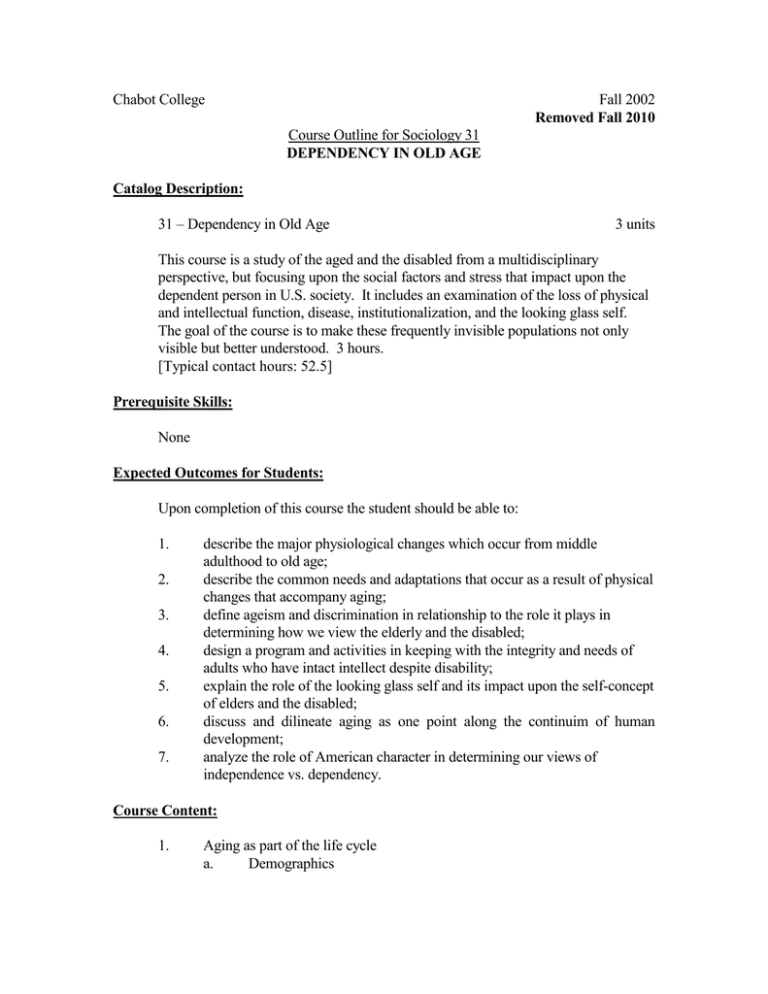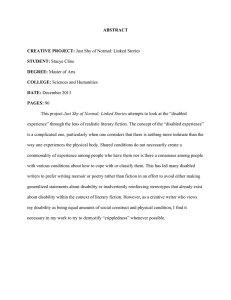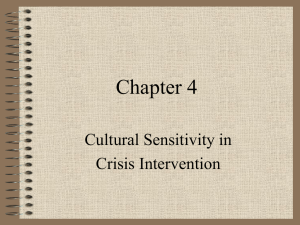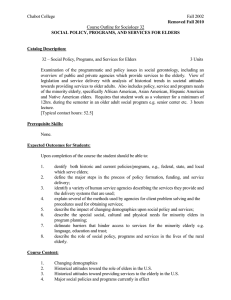Chabot College Fall 2002 Course Outline for Sociology 31
advertisement

Chabot College Fall 2002 Removed Fall 2010 Course Outline for Sociology 31 DEPENDENCY IN OLD AGE Catalog Description: 31 – Dependency in Old Age 3 units This course is a study of the aged and the disabled from a multidisciplinary perspective, but focusing upon the social factors and stress that impact upon the dependent person in U.S. society. It includes an examination of the loss of physical and intellectual function, disease, institutionalization, and the looking glass self. The goal of the course is to make these frequently invisible populations not only visible but better understood. 3 hours. [Typical contact hours: 52.5] Prerequisite Skills: None Expected Outcomes for Students: Upon completion of this course the student should be able to: 1. 2. 3. 4. 5. 6. 7. describe the major physiological changes which occur from middle adulthood to old age; describe the common needs and adaptations that occur as a result of physical changes that accompany aging; define ageism and discrimination in relationship to the role it plays in determining how we view the elderly and the disabled; design a program and activities in keeping with the integrity and needs of adults who have intact intellect despite disability; explain the role of the looking glass self and its impact upon the self-concept of elders and the disabled; discuss and dilineate aging as one point along the continuim of human development; analyze the role of American character in determining our views of independence vs. dependency. Course Content: 1. Aging as part of the life cycle a. Demographics Chabot College Course Outline for Sociology 31 Fall 2002 Page 2 Course Content (Cont'd): 2. 3. 4. 5. b. Aging and disability c. Social networks and dependence d. Stereotypes of the aged e. Stereotypes of the disabled American characteristics a. Independence vs. dependence b. Adult socialization and work c. Subculture variations in minority elders and the disabled d. Stress and the social environment e. Coping mechanisms Aging and disability a. The disabled in society b. Physical disability vs. cognitive disability and the elderly c. The developmentally disabled elderly d. Attitudes of health care providers The social world of the elderly and disabled a. Roles and family relationships b. Volunteer caregiving vs. paid caregiving c. Societal support mechanisms d. Institutionalized settings e. Isolation f. Death and dying Societal response to the needs of the elderly and disabled a. Legislation and federal programs b. Community resources Methods of Presentation: 1. 2. 3. 4. 5. Lecture Guided discussion Small group activities and presentations Audio-visual materials, Guest speakers from community groups and agencies Assignments and Methods of Evaluating Student Progress: 1. Typical Assignments a. Outside written assignment on images of the frail/dependent elder Chabot College Course Outline for Sociology 31 Fall 2002 Page 3 Assignments and Methods of Evaluating Students (Cont'd): b. c. d. e. 2. Group assignment on developing an adaptive product to assist the dependent elder Outside assignment in which the student must be fed a meal by a significant other Interview a cognitively intact, physically frail elder Written critique of a poem, essay, short story or video that deals with issues related to dependent minority elders Methods of Evaluating Student Progress a. Grades A-F, based upon the quality of student work demonstrated in quizzes, midterm, final, individual and group assignments, oral presentations and in-class activities b. Clarity and effectiveness in presenting ideas during class discussion of course content c. Critical thinking in demonstrated assessment of what it means to be old in contemporary U.S. society based upon the course content Special Student Materials: None. Textbook(s) (Typical): Aging in a Changing Society, J.A. Thorson, Belmont. Wadsworth Publishing, 2001, or latest edition. The One Hundred Penny Box, S. B. Mathis, New York, Puffin NewBery Library, 2001, or latest edition. Ethnicity & the Dementias, G. Yeo, D. Gallagher-Thompson, Washington, D.C., 2001, or latest edition. Tf:A;/WORD.SOC.31.DOC Revised-2-5-2002








